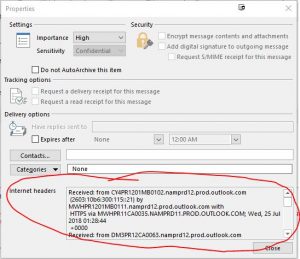
Scarlett said that they had found my resume on a “recruiting website,” but didn’t specify which one. OK, my resume is probably out there on several, because I was job hunting in the early part of 2017. The subject line of the email I received was “CareerBuilder: Great salary package.” Sounds good, right? Who wouldn’t want a great salary package? They were supposedly looking for a “Financier Agent” to help them “in streamlining collections as a consequence to the sale of products and services.” In short, they need someone to help them get payments from their customers in a “timely manner.” The way this would work is that they would have their customers send checks to me. I would deposit them in my bank account, withhold 10% as my “commission,” and transmit the balance to them. There would be various month-end bonuses paid to me if I’m doing a good job and processing things in a timely manner.
After receiving a few of these emails, I decided to take a peek down the rabbit hole and see what else I could learn. I replied to one of the emails, stating that I was interested, and confirming that I understood what they expected me to do. I almost immediately received an email that said “Welcome to our Team, Starting today you are hired…”
Is your B.S. detector going off yet? Mine sure was. Now, I’m a trustworthy guy, but how do they know that? Anyone can put anything on a resume, yet, without anything beyond an exchange of a couple of email messages, they’re going to start having their customers send me thousands of dollars to launder through my personal bank account? Give me a break.
By the way, the return email address on these messages was “graftonopticalcorporation@earthlink.net.” The real Grafton Optical has a Web site at www.graftonoptical.com, and there are several informational email addresses listed on that Web site, all of which are [someone]@graftonoptical.com. Since they obviously have their own email domain, why in the world would they be using an earthlink.com email address for something as important as hiring people for payment processing?
Here, in all probability, is how it would play out: They would send me a check. I would deposit it, and express them 90% of the money, probably in a money order, wire transfer, or cashier’s check (they haven’t specified yet how I should send it). In a few days, my bank would learn that the check I deposited was fraudulent, they would reverse the deposit, and I would, to put it bluntly, be screwed, and possibly in trouble with the law for depositing a phony check.
There are several variations of fake check scams going around: Some start with an offer to purchase something you’ve advertised on line, e.g., on Craig’s List or eBay. Some, like this one, have to do with paying you to do some kind of work at home. Some have to do with a sweepstakes you’ve supposedly won, or are variants of the classic “Nigerian Prince” scam. But they all share one common characteristic – they work often enough to make the scammers’ efforts worthwhile, or they wouldn’t still be doing it. And, tragically, they often prey on people who can least afford to lose money – people who are out of work and looking for a job (remember that they told me they had found my resume on a “recruiting website”), and who may be desperate for money, which makes the scammers, in my opinion, the lowest of the low.
Always keep in mind the old cliche: “If it seems too good to be true, it probably is!” And if you get targeted by a scam like this, do what I did and report it via the FBI’s Internet Crime Complaint Center. Note that the Web form asks for the full “Internet Header” of the email you received. If you’re running Outlook as your mail client, open the message, click on the “File” tab, then click on “Properties.” You’ll find the Internet header information in the area circled in the example below:
Don’t be a victim, folks. And to “Scarlett,” whoever or wherever you may be: I hope enough people report you that the FBI can find you and take you down. In the meantime, you are cordially invited to the theological abode of eternal punishment.
